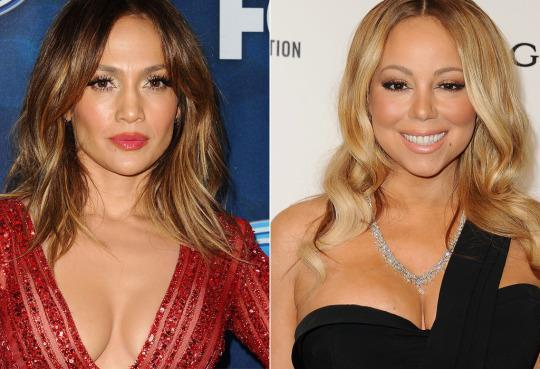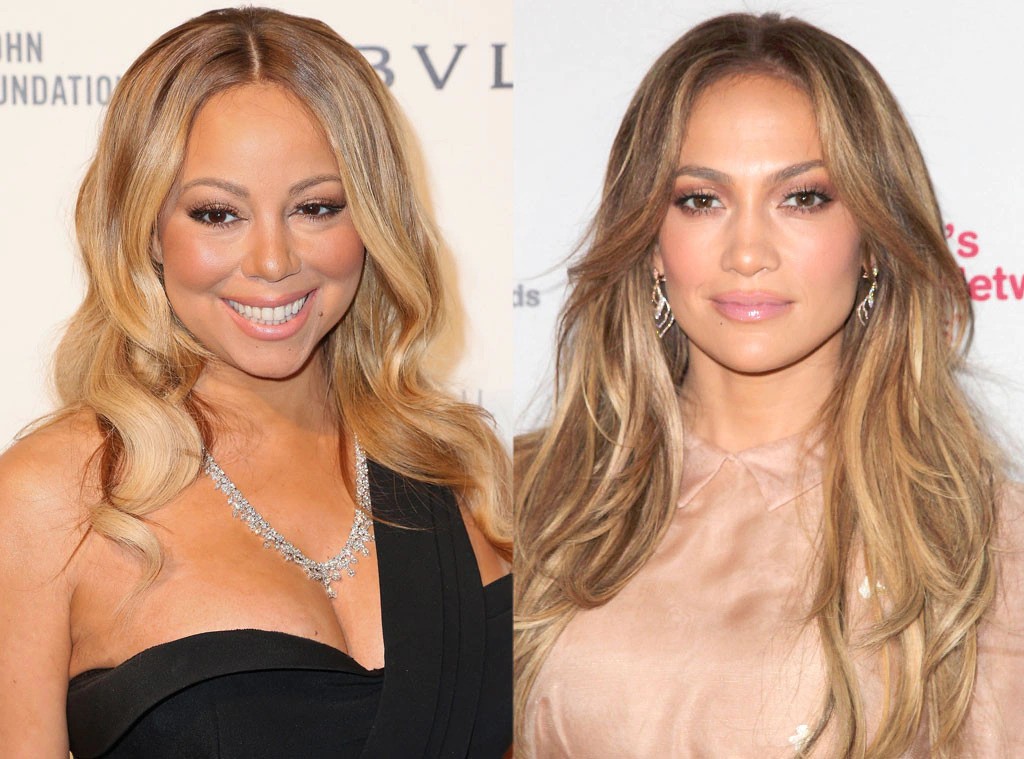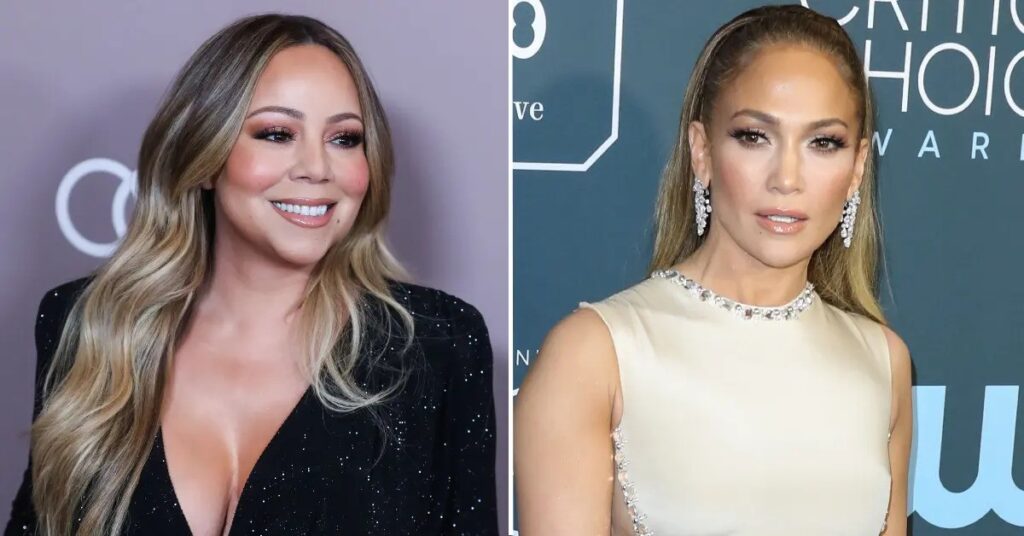Jennifer Lopez has often faced criticism for allegedly appropriating from other artists, particularly Black artists. Mariah Carey is reportedly of the opinion that someone needs to confront her about this. In 2024, when truth is being exposed everywhere, even celebrities are taking this seriously. Mariah wants to remind JLo of her vocal limitations.
There are rivalries, but I don’t believe I’m involved. My focus is on singing and songwriting, which I’ve been doing all my life. Singing is my primary talent, a gift I cherish. JLo’s focus is different. Mariah, at some point in her career, suffered because of JLo—not directly, but because JLo saw what was happening, allowed it, and even participated in making Mariah miserable.
Here’s the backstory: JLo had some fame from “In Living Color,” but struggled to break into singing or Broadway due to her limitations. Then Tommy Mottola, Mariah’s husband at the time, stepped in. Mariah wanted out of her marriage and Sony contract, but Tommy gave JLo a song Mariah had already recorded, “Loverboy,” shelved Mariah’s version, and released JLo’s instead. This left Mariah feeling betrayed and frustrated, which still affects her relationship with JLo today.

Crossing paths with the queen of shade means more than just encountering a little darkness; it’s like having an entire rainforest looming over you. Take Mariah Carey in 2000, for example. When asked for her opinion on fellow women singers in the industry, she graciously complimented Beyoncé’s talent but had little to say about Jennifer Lopez, simply responding with a curt “I don’t.”
Mariah didn’t stop there. In a Talk magazine article where she admitted to surviving on just three hours of sleep per night, she took a jab at JLo’s claim of getting a full eight hours, remarking, “If I had the luxury of not having to sing my own songs, darling, I’d do that too.” Shots fired, indeed.
Some might argue that Jennifer Lopez wasn’t entirely to blame, but she was certainly aware of Tommy’s schemes to sabotage Mariah and willingly played a part.
Tommy Mottola used Jennifer Lopez to get back at Mariah, but this created a problem for JLo moving forward. She needed substantial assistance with her songs to appear as a top-tier artist. And by substantial, I mean resorting to outright plagiarism, particularly from black female artists like Ashanti and Amerie.

Let’s talk about “I’m Real.” This hit wasn’t originally intended for JLo; Ashanti claims it was meant for her. The song was even recorded and mixed with Ashanti’s vocals, which can still be heard in JLo’s version. Ashanti felt betrayed by the decision to hand it over to JLo, admitting it was bittersweet—exciting to be associated with JLo but deeply hurtful to lose out on the opportunity. Later, it came to light that “I’m Real” was first earmarked for Mariah before ending up in Ashanti’s lap. Irv Gotti even confirmed that Tommy instructed him to give the song to JLo as a direct slight against Mariah.
They seemed to anticipate that Ashanti wouldn’t agree to undermine Mariah, so they enlisted JLo instead. Can you believe it? Besides “I’m Real,” did you know Ashanti also wrote the lyrics for another one of JLo’s hits, “Ain’t It Funny”? She wrote and sang the chorus, adding ad-libs, while JLo simply had to turn up at the studio and contribute minimally to the vocals. How did that even happen? Did JLo write the song for herself, or was it written for her?
But wait, there’s more. Fat Joe once revealed that “What’s Love” almost went to JLo instead of Ashanti. Even though JLo knew the song was already given to Ashanti, she was eager to snatch it away. According to Fat Joe, Earth and J called him up at 3:00 in the morning, saying, “Come down, we’ve made a song for you.” When he got to the studio at 4:00 a.m., they played “What’s Love” and told him it was for him and JLo, aiming to feature Latinos on the track. Just imagine “What’s Love” with JLo instead of Ashanti! Thankfully, Fat Joe stood firm and insisted on doing the song only with Ashanti.

Ashanti herself has spoken about not being credited for her work. It took over two decades for her to openly admit how unfairly she was treated in the industry. In an interview with Metro UK, she emphasized the importance of receiving due credit: “You should always care about credit for what you do, regardless of your industry. Giving credit is crucial, especially now when things are so smoke and mirrors. It’s frustrating.”
The word has been spreading over the past few years, and I’m appreciative. Many people are now aware and they were surprised, but my reaction is more of gratitude. During the interview, Ashanti also shared her emotions regarding situations where her vocals were used by people like JLo without giving her credit. She added, “It’s strange because, of course, you feel frustrated for not receiving credit or recognition, but then that turns into something you’re admired for.”
This echoes what Mariah Carey has been expressing about JLo—that you can’t simply appropriate someone’s artistry and pass it off as your own without acknowledging them. Another artist JLo affected was Amerie. Speculations were already circulating that Beyoncé had borrowed from Amerie’s style. Although I know Beyoncé’s fans might disagree, the evidence supports it. I’ve always believed Amerie was the original Beyoncé.
Did Beyoncé borrow from Amerie’s style? Consider ‘Crazy in Love’ and Amerie’s ‘Fall in Love’ videos. Amerie was closely collaborating with Rich Harrison and was meant to be his star artist. However, Beyoncé’s team seemingly presented an irresistible proposal to Harrison, leading him to work with Beyoncé instead, which shaped Beyoncé’s early sound, characterized by that distinctive go-go vibe.
I could delve deeply into the Amerie-Beyoncé comparison in another video, but let’s focus on JLo for now. You’re familiar with Amerie’s hit ‘One Thing,’ right? Did you know that Columbia Records attempted to shelf the single because JLo was preparing her album ‘Rebirth’? There were even rumors that Columbia wanted JLo to record ‘One Thing’ instead of Amerie, prompting Amerie to leak the song to radio stations to prevent this from happening.

After Amerie’s leak, Columbia had to come up with something similar for JLo, resulting in ‘Get Right,’ which also features that go-go feel. Amerie faced challenges as her record label ceased promoting her music, frustrating her desire to pursue her own creative path. On the flip side, JLo was determined to do whatever necessary to remain at the top, even if it involved sabotaging and appropriating from other artists. She was willing to engage in the very tactics Amerie refused—to play the game with the men.
Many influential decision-makers in the industry are men, which isn’t inherently negative. However, issues arise when they impose specific expectations on women, demanding conformity in their artistry. This dynamic partly explains why Jennifer Lopez, despite not being the strongest vocalist, has enjoyed remarkable success in her career, often overshadowing talents like Ashanti and Amerie.
Recently, with JLo’s documentary release, Mariah Carey appears to hold her responsible for the careers she may have hindered or undermined. While I’ve only mentioned Mariah, Amerie, and Ashanti in this context, exploring the full extent would be a day-long endeavor.
In this era of truth-telling, share your thoughts on Mariah’s critique of JLo in the comments below. Let’s engage in a candid discussion.










